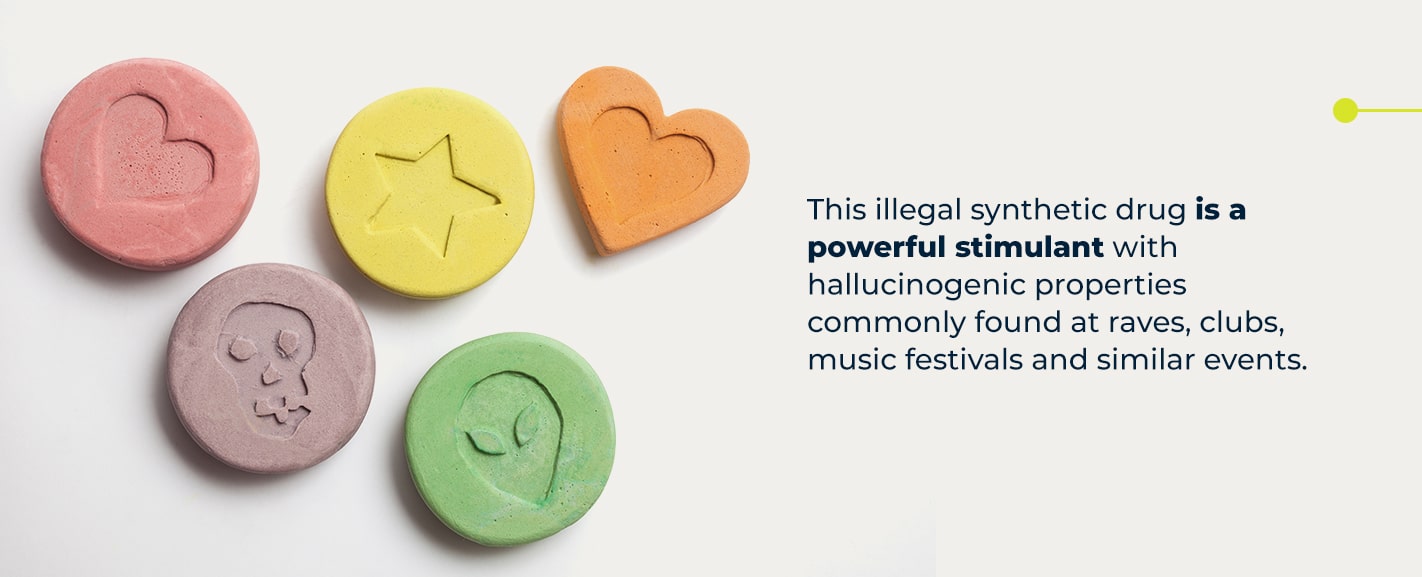Ecstasy, otherwise known as MDMA, is a drug commonly associated with the rave and club scenes. But what many people don’t know is that it is classified as a stimulant drug. In this article, we’ll explore what ecstasy is, how it works, and whether it is truly a stimulant drug. Get ready to dive deep into the fascinating world of ecstasy.

What is Ecstasy?
Ecstasy, also known as 3,4-methylenedioxymethamphetamine (MDMA), is a synthetic drug classified as a stimulant and hallucinogen. It is primarily used recreationally to induce euphoria and feelings of wellbeing. MDMA was initially developed in 1912 as an appetite suppressant, but its use as a recreational drug has been documented since the 1970s. Ecstasy is often found in pill form, but it can also be found in powder or liquid form. Ecstasy is most commonly taken orally, but it can also be snorted, injected, or smoked.
Short-term Effects
The effects of ecstasy can be felt within 20 minutes to an hour after ingestion. The effects of the drug can last up to six hours. The primary effects of ecstasy are increased energy, euphoria, and enhanced sensory perception. Other short-term effects may include increased heart rate, sweating, jaw clenching, nausea, and impaired motor coordination.
Long-term Effects
Long-term use of ecstasy can lead to psychological and physiological problems. Chronic users of the drug are at risk of developing depression, anxiety, and cognitive impairments. Ecstasy can also cause dehydration, muscle tension, and sleep disturbances. Long-term use of the drug can also lead to tolerance, meaning that users need to take higher doses in order to achieve the same effects.
Is Ecstasy a Stimulant Drug?
Yes, ecstasy is classified as a stimulant drug. Stimulant drugs are those which increase alertness and energy levels. Ecstasy is believed to work by increasing levels of serotonin, dopamine, and norepinephrine in the brain, which results in increased energy, enhanced mood, and improved cognitive functioning.
Physical Effects
The physical effects of ecstasy can include increased heart rate, blood pressure, body temperature, and breathing. These effects can be dangerous and can lead to dehydration, muscle tension, and other health problems.
Psychological Effects
The psychological effects of ecstasy can be profound. The drug induces feelings of euphoria, increased energy, and enhanced sensory perception. These effects can be beneficial in small doses but can be dangerous when taken in large amounts or over long periods of time.
How is Ecstasy Used?
Ecstasy is most commonly used as a recreational drug. It is often taken orally, but it can also be snorted, injected, or smoked. Ecstasy is often used in combination with other drugs, such as alcohol, marijuana, and cocaine. This can lead to unpredictable and dangerous effects.
Health Risks
The use of ecstasy is associated with a number of health risks. These include dehydration, muscle tension, sleep disturbances, depression, anxiety, cognitive impairments, and even death.
Addiction
Long-term use of ecstasy can lead to physical and psychological dependence. Those who are dependent on the drug may experience withdrawal symptoms such as depression, anxiety, and cravings. In severe cases, users may experience hallucinations and delusions.
Frequently Asked Questions
What is Ecstasy?
Ecstasy is a psychoactive drug, commonly referred to as a “party drug” or “club drug”. It is a synthetic, psychoactive drug chemically similar to the stimulant amphetamine and the hallucinogen mescaline. Ecstasy is a stimulant drug that alters mood and perception, and has stimulant and hallucinogenic properties. It is most often taken in pill form, though it can also be snorted, smoked, or injected.
What are the Effects of Ecstasy?
The effects of ecstasy vary depending on the individual, the dosage, and the route of administration, among other factors. Generally, the effects of ecstasy include increased energy, pleasure, emotional warmth, and distortions in time and sensory perception. It can also cause nausea, chills, sweating, teeth grinding, muscle tension, and blurred vision.
Is Ecstasy a Stimulant Drug?
Yes, ecstasy is a stimulant drug. It is a synthetic, psychoactive drug chemically similar to the stimulant amphetamine and the hallucinogen mescaline. Ecstasy increases energy, alertness, and physical activity, as well as feelings of pleasure, emotional warmth, and distortions in time and sensory perception.
What are the Risks of Taking Ecstasy?
Ecstasy is associated with multiple risks, including dehydration, overheating, anxiety, depression, and addiction. It can also cause high blood pressure, heart palpitations, nausea, chills, sweating, teeth grinding, and blurred vision. Long-term use of ecstasy can lead to memory problems, difficulty concentrating, and sleep disturbances.
Are There any Legal Consequences for Taking Ecstasy?
Yes, there are potential legal consequences for taking ecstasy. Depending on the country or region, there may be laws that prohibit the possession, sale, and/or use of ecstasy. In many countries, ecstasy is classified as an illegal substance, and possession, sale, and/or use of the drug can lead to criminal penalties.
What are the Treatment Options for Ecstasy Addiction?
Treatment options for ecstasy addiction vary depending on the individual and the severity of their addiction. Generally, the most effective treatment involves a combination of psychotherapy, cognitive-behavioral therapy, and medications. Medications such as buprenorphine, naltrexone, and naloxone can be used to reduce cravings and withdrawal symptoms. Additionally, support groups and 12-step programs can be helpful in the recovery process.
Your Brain On MDMA
In conclusion, Ecstasy is a stimulant drug that has been highly popularized throughout the world. Its effects can be both beneficial and detrimental, depending on the person and their individual situation. While the drug may provide feelings of euphoria and pleasure, it can also be extremely dangerous and even fatal. Therefore, it is important for people to be aware of the risks associated with this drug and to make informed decisions when considering its use.

